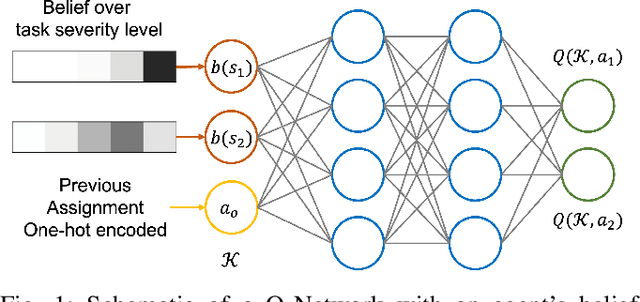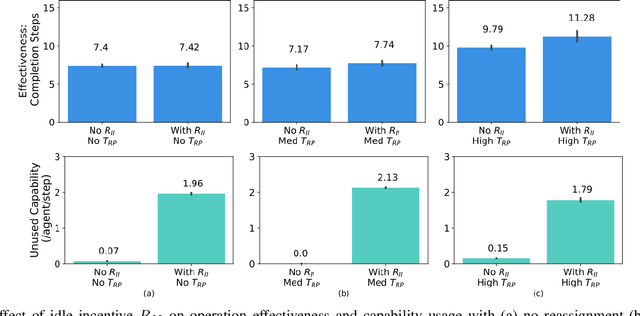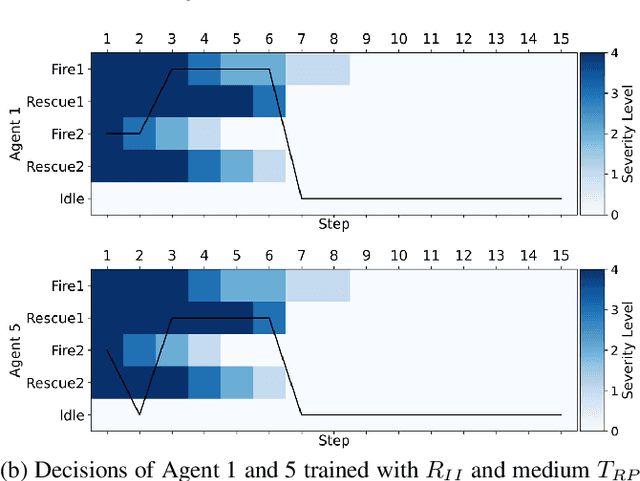Bogdan I. Epureanu
Task Allocation with Load Management in Multi-Agent Teams
Jul 17, 2022



Abstract:In operations of multi-agent teams ranging from homogeneous robot swarms to heterogeneous human-autonomy teams, unexpected events might occur. While efficiency of operation for multi-agent task allocation problems is the primary objective, it is essential that the decision-making framework is intelligent enough to manage unexpected task load with limited resources. Otherwise, operation effectiveness would drastically plummet with overloaded agents facing unforeseen risks. In this work, we present a decision-making framework for multi-agent teams to learn task allocation with the consideration of load management through decentralized reinforcement learning, where idling is encouraged and unnecessary resource usage is avoided. We illustrate the effect of load management on team performance and explore agent behaviors in example scenarios. Furthermore, a measure of agent importance in collaboration is developed to infer team resilience when facing handling potential overload situations.
* 8 pages, 5 figures, 2022 IEEE International Conference on Robotics and Automation
Analysis of the Synergy between Modularity and Autonomy in an Artificial Intelligence Based Fleet Competition
Jul 02, 2019



Abstract:A novel approach is provided for evaluating the benefits and burdens from vehicle modularity in fleets/units through the analysis of a game theoretical model of the competition between autonomous vehicle fleets in an attacker-defender game. We present an approach to obtain the heuristic operational strategies through fitting a decision tree on high-fidelity simulation results of an intelligent agent-based model. A multi-stage game theoretical model is also created for decision making considering military resources and impacts of past decisions. Nash equilibria of the operational strategy are revealed, and their characteristics are explored. The benefits of fleet modularity are also analyzed by comparing the results of the decision making process under diverse operational situations.
Analysis of Fleet Modularity in an Artificial Intelligence-Based Attacker-Defender Game
Nov 09, 2018



Abstract:Because combat environments change over time and technology upgrades are widespread for ground vehicles, a large number of vehicles and equipment become quickly obsolete. A possible solution for the U.S. Army is to develop fleets of modular military vehicles, which are built by interchangeable substantial components also known as modules. One of the typical characteristics of module is their ease of assembly and disassembly through simple means such as plug-in/pull-out actions, which allows for real-time fleet reconfiguration to meet dynamic demands. Moreover, military demands are time-varying and highly stochastic because commanders keep reacting to enemy's actions. To capture these characteristics, we formulated an intelligent agent-based model to imitate decision making process during fleet operation, which combines real-time optimization with artificial intelligence. The agents are capable of inferring enemy's future move based on historical data and optimize dispatch/operation decisions accordingly. We implement our model to simulate an attacker-defender game between two adversarial and intelligent players, representing the commanders from modularized fleet and conventional fleet respectively. Given the same level of combat resources and intelligence, we highlight the tactical advantages of fleet modularity in terms of win rate, unpredictability and suffered damage.
 Add to Chrome
Add to Chrome Add to Firefox
Add to Firefox Add to Edge
Add to Edge